How 'Unforgiven' Ended The Western Genre (For A Hot Minute)
Westerns were all the range from the 50s through the 90s. Then "Unforgiven" came and gunned most of them down for a decade or more. What happened?

If you clicked on this article to read, then you must love Westerns, or at least like them. Unless you're some two-bit varmint up to no good. But that's on you. With the Deadwood movie coming back, Westworld dominating HBO, and classic genre entries like Bone Tomahawk finding audiences online, it's hard to imagine a time when the Western wasn't incredibly popular.
But did one movie kill it? Or was it a combination of things?
Today we're going to talk about Unforgiven, give a brief history of the film, and look at how its release relatively killed off Westerns for a decade or more.
The History of Unforgiven
Unforgiven was released on August 7, 1992. It was Clint Eastwood's 16th movie as a director and his 34th as a lead actor. That seems staggering, but in my mind, Clint Eastwood has looked weathered since the 1960s, so maybe it's not that hard to believe. What's harder to believe is that Unforgiven was the first movie to earn Eastwood an Oscar nomination. Yeah, that's crazy. Lucky for him, he got three out of the movie. Best Actor, Best Picture, and Best Director. He won for Picture and Director. At the time, he was the oldest person to ever take home the director trophy.
And he's been looking to break his own record ever since.
Check out the trailer for Unforgiven.
Eastwood waited his entire life to star in this movie. He found and loved the script when he was younger, but knew he'd have to age into the role. That was scary and Eastwood didn't originally option the project. Instead, Francis Ford Coppola optioned it. But after five years, Coppola let it lapse and Eastwood sprung into action.
He knew it was violent. He knew it felt like no western that had come before it. But Eastwood had a plan. He brought in the screenwriter of The Outlaw Josey Wales to advise him. Sonia Chernus read the script, then called The Cut-Whore Killings and was horrified. She wrote Eastwood this: "We would have been far better off not to have accepted trash like this piece of inferior work...I can't think of one good thing to say about it. Except maybe, get rid of it FAST."
That didn't go as planned.
Eastwood decided it needed a rewrite. But that didn't go well either. Eastwood said, "The more I fiddled with it, the more I realized I was screwing it up." All he ended up changing was the title. It had to reflect the story. The characters. Not just in the script but also the characters Eastwood was known for playing. Guys who killed without mercy and without consequence.
Did that weigh on them? Not in their movies. But it would in this one.
This one was about regrets.
Can good come from violence?
This is the central question at the heart of Unforgiven, and the definitive answer is "no."
After a prostitute shoots a man who takes it too far, she's cut as punishment. The other girls raise money to get their vengeance. That legend makes its way to Will Munny. A guy who knows violence through and through. But Will is different now. He's old, he found love, and he knows that that love was worth more than the anger and violence that came before it. But that love is dead. And the money goes a long way in helping his farm.
And justice might help his soul.
But it doesn't.
Modern audiences were used to westerns where the good guys won. They had been raised on white hats and black hats. Unforgiven came along and everything seemed grey. This moral grey area meant that when the sun came up at the end of the movie, the bodies of good men were still dead.
It meant that when characters killed, they felt the repercussions of those deaths.
The violence left a bad taste in both the characters and audiences mouthes.
Westerns had most recently been lampooned in Back to the Future Part III and were young, sleek, and sexy in movies like Young Guns. After Unforgiven came out it was hard to imagine those movies being released later and making a mark. The whole culture shifted after it saw Eastwood, one of the most famous western actors of all time, in the best westerns of all time, play a role where it seemed like those characters were his burden.
The movie subverted expectations in such a way that appetites kind of petered off.
Sure, movies like Tombstone and Wyatt Earp did okay at the box office, but they had to be a little light and fluffy. Maverick was the same way. They were westerns, but they never achieved the cultural zeitgeist that the titles that came before them were able to achieve. And they were always compared to the complex morality of Unforgiven.
Much like the cuts on the prostitutes' faces, Unforgiven made us look at the western genre and find the humanity in what we were told was only an object, and what we saw made us not want to look back for a long time.
What's next? How 'Vertigo' Changed Hollywood!
Alfred Hitchcock is a true master and one of the greatest directors of all time. His work has shaped everything from Jordan Peele's Us to M. Night Shyamalan's Sixth Sense. There's no doubt Hitch left an indelible mark on Hollywood, especially thanks to his seminal films Psycho, The Birds, and Rear Window.
When people bring up Vertigo, they usually refer to it as "that weird one," at least that's what my friend said when I mentioned writing this article.
So click the link to learn more about Vertigo!











